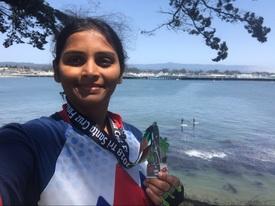consult with a dietician - key lessons learne
Replies
-
Great information! I'm going to have a protein shake after my cardio workouts now too!0
-
bump0
-
bumpity bump!0
-
Some very interesting information and discussion on here. Thank you!0
-
Bumping so I can find and read this properly later!!
 0
0 -
I've actually been trying to find some contradictory studies on this topic today (the eating after resistance thing), but really couldn't find any studies that refute this theory.
Does anyone have any studies that show results that are at odds with eating soon after a glucose depletion workout? For the life of me, I can't find a single one. I really like looking at both sides of an issue if I can before making my mind up, and a study or two on this would be great.0 -
I've actually been trying to find some contradictory studies on this topic today (the eating after resistance thing), but really couldn't find any studies that refute this theory.
Does anyone have any studies that show results that are at odds with eating soon after a glucose depletion workout? For the life of me, I can't find a single one. I really like looking at both sides of an issue if I can before making my mind up, and a study or two on this would be great.
Did you check out T-Nation? There is a post about top ten fitness myths, I think it had links to studies about that.0 -
Thanks so much for this!0
-
Thanks for sharing0
-
I've actually been trying to find some contradictory studies on this topic today (the eating after resistance thing), but really couldn't find any studies that refute this theory.
Does anyone have any studies that show results that are at odds with eating soon after a glucose depletion workout? For the life of me, I can't find a single one. I really like looking at both sides of an issue if I can before making my mind up, and a study or two on this would be great.
Did you check out T-Nation? There is a post about top ten fitness myths, I think it had links to studies about that.
yeah, read it. I've also already read (lol) every single study that he cited (except for a couple on antioxidants that I really haven't gone to deep into yet, some day I will). That's a little scary. The problem is, who ever wrote it (someone named David Barr) is guilty of much of the same "telephone game" that he rails on in his article. In many cases he starts his sentance off with the words "I think..." and "to me..." which isn't the way you want to present a fact based breakdown of myths, as it denotes opinion and not fact. He made some good points, but generally his article is pointed towards heavy body building types, and what may very well be good info for someone looking to eek out that extra 1 to 2% mass increase for their workouts, really doesn't make much difference to the rest of us. His points about glycogen re-synthesis were (quoting here)
now, looking closely at this paragraph, you'll see that he downplays a 16% increase in glycogen re-synthesis. I don't know about you, but to me, that's a pretty large jump, 16% over 16 or 24 hours means a lot of extra fuel for the next day's workout. He also mentions that glycogen levels will be maximized after a 24 hour recovery period. I know that in the studies listed above (by myself and stormie) they talk about glycogen replenishing about 50% after depletion in 24 hours, so getting that extra 16% could be the difference between full recovery and shorting yourself the next day.Surprisingly, one study showed that consuming carbohydrates after strength training only increased muscle glycogen by 16% more than when water was consumed (Pascoe et al., 1993)! With this information and the huge amount of carbs that we consume on a daily basis, we should have little doubt that glycogen levels will be maximized within 24 hours of the workout.0 -
I don't think anyone here is recommending NOT to take in nourishment (mostly protein) after a workout, which I do anyways. What I personally got out of the article is to NOT fret about missing a supposed 30-45 min window post-workout (strenuous) for protein synthesis (muscle rebuilding) to occur. After I strength train at the gym, I'd rather put in 30-40 minutes of cardio and take a leisurely shower afterward instead of worrying about rushing straight home to make my protein shake before that "45 minute window" closes. I've done it both ways and personally haven't noticed an appreciable difference in muscle gains or fat loss between the two. But your result may vary.0
-
hi banks, it's definitely hard to find legitimate, credible studies that show the uselessness of refueling after exercise. but there seem to be a lot pointing to the importance of it. one example is this recent one published in the ISSA journal: http://www.jissn.com/content/6/1/11. its references include one by Levenhagen specifically about timing of post-nutrient exercise. i'm at work now so i don't have time to look at other journals... but because i work at a pharma company, i have access to over 85 nutrition-oriented journals - please let me know if there are any particular articles you'd like to get a copy of. given that you're a PT, i understand how important it'd be to you to be armed with credible data
 0
0 -
hi banks, it's definitely hard to find legitimate, credible studies that show the uselessness of refueling after exercise. but there seem to be a lot pointing to the importance of it.
Again, no one here (or at least not myself) is refuting the importance of refueling after exercise or the bulk of the tremendous info you're dietician provided you. I myself fuel up before, during (energy drink with BCAA's) and after strenuous workouts. I'm not necessarily refuting what Drs. John Ivy and Robert Portman tout in their book "Nutrient Timing: The Future of Sports Nutrition." You can find a good summary of their research here:
http://www.utexas.edu/features/archive/2004/nutrition.html
Banks asked for an article in reference to another poster's disagreement of the 45-minute window post-workout, and I recalled a T-Nation article I've seen before and posted it here.
Like so many things regarding exercise and nutrition, there is a lot of differing opinions out there on just about any subject or detail (e.g. low carbs vs reg carbs, cardio vs weights, eat exercise calories vs don't eat exercise calories and on and on) and it seems like the "45-minute post-exercise window" is one of them. And I'll just leave it at that.
But please continue to share what you learned from your dietician as it can help a great many of MFP users. I find much of it very informative and useful, as I'm sure others do.0 -
Gatorade, LOL! You don't need post workout glycogen replacement unless you are endurance training. Use a heart rate monitor and look at your calorie burn. If your a weekend warrior type or just doing general fitness, you need nothing post exercise.0
-
Today's meeting with my dietician was about SUPPLEMENTS. To be honest, I've always had mixed feelings about this one. First, I guess I felt like if we ate clean enough, we wouldn't need them. Second, it sounds like a gimmick to make money. Third, i've have an aversion to swallowing pills and gagging on them ever since childhood. Considering all this, it's a big step that i took today in even buying a bottle of vitamin d pills, and an AM/PM multivitamin for women! And i'll bring them on my business trip coming up soon, so I can start getting into the habit of taking them.
Anyway, here are the TOP 7 supplements that Ryan recommended, and the rationale:
1) COMPREHENSIVE AM/PM MULTIVITAMIN
-Humans need more than 50 key nutrients for proper metabolism
-People do not eat well enough. The avg American doesn't meet recommended nutrient status of many vitamins/minerals. Nutrient deficiency, esp. trace minerals such as iodine and zinc can reduce the function of one's metabolism
-Our soils have nowhere near the nutrients they once did, and therefore, our food doesn't have the same level of minerals we once thought. In fact, mineral content of US soils has reduced by 85% in past 100 years
2) OMEGA-3 FISH OIL
-Fish oil has demonstrated a protective role in wide range of diseases, incl. heart disease, cancer, diabetes, inflammatory diseases, major depressive order, and bipolar disorder, as well as Alzheimer's and cognitive decline.
-There are two essential fats: Omega 3 and Omega 6. Omega 3 can be found in things like salmon and flaxseed oil, Omega 6 in corn oil, safflower oil, soybean oil. Omega 3 is anti-inflammatory, but Omega 6 has a pro-inflammatory effect and is linked to diseases such as cancer and autoimmune diseases
-The US diet currently has a ratio of 16:1 for Omega 6 to 3, when it should be 2:1. The easiest way to do this is to consume fish oil. Recommendation is 1000 mg EPA daily
3) VITAMIN D (2000-3000 IU/day)
-In the US, an estimated 58% of teens and adults are vitamin D deficient
-It plays an important role in preventing bone disease, but also cancer (colon, prostate, breast, esophagus), diabetes, CVDs, autoimmune diseases
-Experts believe at least 1000-2000 IU of vit D/day is required for vit D sufficiency, and that the body can use up to 5000 IU of vit D/day
4) CALCIUM (1000 mg/day) / MAGNESIUM (500 mg/day)
-Calcium is important for bone health, strong teeth, and working muscles
-Magnesium deficiency is linked to insulin resistance (diabetes)
5) MULTI-PROBIOTIC
-Probiotics are basically bacteria that help stimulate a healthy digestive system, leading to optimal nutrient absorption and detoxification (on a side note, Similac and many other infant formulas contain probiotics - and nowadays a lot of foods tout that they have probiotics)
6) DIM (Diindolylmethane)
-Supports the liver's detox process, esp. healthy detox of hormones, such as estrogen
7) WHEY PROTEIN ISOLATE
-Isolate is the ideal protein source for muscle recovery and repair
-The biological components of whey have been reported to have immune enhancing properties, act as an antioxidant, antihypertensive, antitumor, hypolipidemic, antiviral, antibacterial, and chelating agent
Sounds like a lot, right? ;P Ryan, knowing of my aversion to pills, said that he wanted me to focus on getting the top 3 into my daily regimen. In the back of my mind, I know that the science makes sense. And as much as I'd like to think that my diet should meet RDA values, it's nowhere near that. So, trying to be open-minded, I bought some on the way home. It will be amazing if this becomes a habit of mine!
Do you take any supplements? What do you think are the most important ones?0 -
Thanks for sharing0
-
Do you take any supplements? What do you think are the most important ones?
I take a prenatal multi-vitamin, a glucosamin/chondroitin/msm supplement, and fish oil.
The most important for me is the multi-vitamin. I have been borderline anemic; the supplement keeps me in a healthy range. The others I take due to osteoarthritis in knees & hips, PFS, and general joint health. If I'm going to build my large leg muscles, they're vital.
Oh... and whey protein. Either as a protein boost for high carb days or, more frequently, post strength workouts.0 -
This really cleared up some things for me! Thanks for the great info!:flowerforyou:0
-
Thanks for posting... these are all issues I have been working on and thinking about seeing a dietician about... always nice to have some science behind our efforts.0
-
Great information! Thank you so much for sharing!!0
-
I was just wondering if I was eating properly after my workout. I grabbed some 0% fage greek yogurt and chop up some strawberrys in it. I guess I did well. I have some isolate whey protein so I can implement that as well.
Thanks :0)0 -
bump0
-
Awesome info! Thanks!! BUMPITY BUMP BUMP!0
-
:flowerforyou: bump0
-
And here are the references

-Teitelbaum J. Beat Sugar Addiction Now! 2010
-Marler et al. Human health, the nutritional quality of harvested food and sustainable farming systems. The Nutrition Security Institute
-Talbott S. The Cortisol Connection: Why Stress Makes You Fat and Ruins Your Health. 2007
-Anderson et al. Are all n-3 polyunsaturated fatty acids created equal? Lipids in Health and Disease, 2009
-Calder P. n-3 Polyunsaturated fatty acids, inflammation, and inflammatory diseases. American Journal of Clinical Nutrition 2010
-Ross et al. Omega 3 fatty acids as treatments for mental illness: which disorder and which fatty acid? Lipids in Health and Disease, 2007
-Morris M. The role of nutrition in Alzheimer's disease: epidemiological evidence. Eur J of Neurology, 2009
-Zhou et al. Optimizing vitamin D status to reduce colorectal cancer risk: an evidentiary review. Clinical Journal of Oncology Nursing 2009
-Holick M. The vitamin D pandemic and consequences for nonskeletal health: mechanism of action. Molecular Aspects of Medicine 20080 -
Oops forgot to add, Ryan mentioned that you can ask your doctor to get your vitamin D levels tested. They should be in the range of 60-100 nanograms/mL. If not, it'd be a good idea to up your vit D intake.0
-
Great information, thanks for posting.0
-
I currently take CoEnzyme Q10 because it helps to stabilize blood pressure. I struggle with pills, too. But Ryan may have given me some compelling reasons to start taking a multivitamin at the very least.0
-
Bump to read later.0
-
Please keep posting what you learn! Thank you so much for sharing!0
This discussion has been closed.
Categories
- All Categories
- 1.4M Health, Wellness and Goals
- 398.1K Introduce Yourself
- 44.7K Getting Started
- 261K Health and Weight Loss
- 176.4K Food and Nutrition
- 47.7K Recipes
- 233K Fitness and Exercise
- 462 Sleep, Mindfulness and Overall Wellness
- 6.5K Goal: Maintaining Weight
- 8.7K Goal: Gaining Weight and Body Building
- 153.5K Motivation and Support
- 8.4K Challenges
- 1.4K Debate Club
- 96.5K Chit-Chat
- 2.6K Fun and Games
- 4.8K MyFitnessPal Information
- 12 News and Announcements
- 21 MyFitnessPal Academy
- 1.5K Feature Suggestions and Ideas
- 3.2K MyFitnessPal Tech Support Questions















